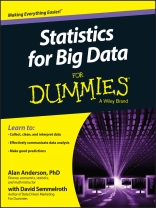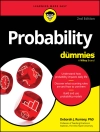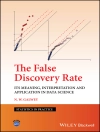The fast and easy way to make sense of statistics for big
data
Does the subject of data analysis make you dizzy? You’ve come to
the right place! Statistics For Big Data For Dummies breaks
this often-overwhelming subject down into easily digestible parts,
offering new and aspiring data analysts the foundation they need to
be successful in the field. Inside, you’ll find an easy-to-follow
introduction to exploratory data analysis, the lowdown on
collecting, cleaning, and organizing data, everything you need to
know about interpreting data using common software and programming
languages, plain-English explanations of how to make sense of data
in the real world, and much more.
Data has never been easier to come by, and the tools students
and professionals need to enter the world of big data are based on
applied statistics. While the word 'statistics’ alone can evoke
feelings of anxiety in even the most confident student or
professional, it doesn’t have to. Written in the familiar and
friendly tone that has defined the For Dummies brand for more than
twenty years, Statistics For Big Data For Dummies takes the
intimidation out of the subject, offering clear explanations and
tons of step-by-step instruction to help you make sense of data
mining–without losing your cool.
* Helps you to identify valid, useful, and understandable
patterns in data
* Provides guidance on extracting previously unknown information
from large databases
* Shows you how to discover patterns available in big data
* Gives you access to the latest tools and techniques for working
in big data
If you’re a student enrolled in a related Applied Statistics
course or a professional looking to expand your skillset,
Statistics For Big Data For Dummies gives you access to
everything you need to succeed.
Spis treści
Introduction 1
Part I: Introducing Big Data Statistics 7
Chapter 1: What Is Big Data and What Do You Do With It? 9
Chapter 2: Characteristics of Big Data: The Three Vs 19
Chapter 3: Using Big Data: The Hot Applications 27
Chapter 4: Understanding Probabilities 41
Chapter 5: Basic Statistical Ideas 57
Part II: Preparing and Cleaning Data 81
Chapter 6: Dirty Work: Preparing Your Data for Analysis 83
Chapter 7: Figuring the Format: Important Computer File Formats 99
Chapter 8: Checking Assumptions: Testing for Normality 107
Chapter 9: Dealing with Missing or Incomplete Data 119
Chapter 10: Sending Out a Posse: Searching for Outliers 129
Part III: Exploratory Data Analysis (EDA) 141
Chapter 11: An Overview of Exploratory Data Analysis (EDA) 143
Chapter 12: A Plot to Get Graphical: Graphical Techniques 155
Chapter 13: You’re the Only Variable for Me: Univariate Statistical Techniques 173
Chapter 14: To All the Variables We’ve Encountered: Multivariate Statistical Techniques 191
Chapter 15: Regression Analysis 215
Chapter 16: When You’ve Got the Time: Time Series Analysis 243
Part IV: Big Data Applications 269
Chapter 17: Using Your Crystal Ball: Forecasting with Big Data 271
Chapter 18: Crunching Numbers: Performing Statistical Analysis on Your Computer 297
Chapter 19: Seeking Free Sources of Financial Data 319
Part V: The Part of Tens 331
Chapter 20: Ten (or So) Best Practices in Data Preparation 333
Chapter 21: Ten (or So) Questions Answered by Exploratory Data Analysis (EDA) 339
Index 349
O autorze
Alan Anderson, Ph D, is a professor of economics and finance at Fordham University and New York University. He’s a veteran economist, risk manager, and fixed income analyst.
David Semmelroth is an experienced data analyst, trainer, and statistics instructor who consults on customer databases and database marketing.












